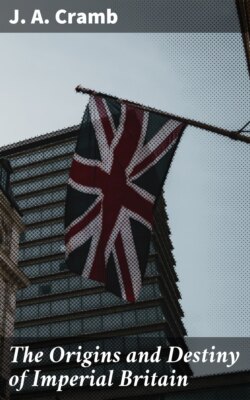Читать книгу The Origins and Destiny of Imperial Britain - J. A. Cramb - Страница 18
На сайте Литреса книга снята с продажи.
WHAT IS IMPERIALISM? [Tuesday, May 8th, 1900]
ОглавлениеThe present age has rewritten the annals of the world, and set its own impress on the traditions of humanity. In no period has the burden of the past weighed so heavily upon the present, or the interpretation of its speculative import troubled the heart so profoundly, so intimately, so monotonously.
How remote we stand from the times when Raleigh could sit down in the Tower, and with less anxiety about his documents, State records, or stone monuments than would now be imperative in compiling the history of a county, proceed to write the History of the World! And in speculation it is the Tale, the fabula, the procession of impressive incidents and personages, which enthralls him, and with perfect fitness he closes his work with the noblest Invocation to Death that literature possesses. But beneath the variety or pathos of the Tale the present age ever apprehends a deeper meaning, or is oppressed by a sense of mystery, of wonder, or of sorrow unrevealed, which defies tears.
This revolution in our conception of History, this boundless industry which in Germany, France, England, Italy, has led to the printing of mountains of forgotten memoirs, correspondences, State papers, this endless sifting of evidence, this treasuring above riches of the slight results slowly and patiently drawn, is neither accident, nor transient caprice, nor antiquarian frenzy, but a phase of the guiding impulse, the supreme instinct of this age—the ardour to know all, to experience all, to be all, to suffer all, in a word, to know the Truth of things—if haply there come with it immortal life, even if there come with it silence and utter death. The deepened significance of history springs thus from the deepened significance of life, and the passion of our interest in the past from the passion of our interest in the present. The half-effaced image on a coin, the illuminated margin of a mediaeval manuscript, the smile on a fading picture—if these have become, as it were, fountains of unstable reveries, perpetuating the Wonder which is greater than Knowledge, it is a power from the present that invests them with this magic. Life has become more self-conscious; not of the narrow self merely, but of that deeper Self, the mystic Presence which works behind the veil.
World-history is no more the fairy tale whose end is death, but laden with eternal meanings, significances, intimations, swift gleams of the Timeless manifesting itself in Time. And the distinguishing function of History as a science lies in its ceaseless effort not only to lay bare, to crystallize the moments of all these manifestations, but to discover their connecting bond, the ties that unite them to each other and to the One, the hidden source of these varied manifestations, whether revealed as transcendent thought, art, or action.
Hence, as in prosecuting elsewhere our inquiry into the origin of the French Monarchy or the decline of oligarchic Venice, we examined not only the characters, incidents, policies immediately connected with the subject, but attempted an answer to the question—What is the place of these incidents in the universal scheme of things? so in the treatment of the theme now before us, the origins of Imperial Britain, pursuing a similar plan, we have to consider not merely the relations of Imperial Britain to the England and Scotland of earlier times, but its relations to mediaeval Europe, and to determine so far as is possible its place amongst the world-empires of the past. I use the phrase "Imperial Britain," and not "British Empire," because from the latter territorial associations are inseparable. It designates India, Canada, Egypt, and the like. But by "Imperial Britain" I wish to indicate the informing spirit, the unseen force from within the race itself, which in the past has shapen and in the present continues to shape this outward, this material frame of empire. With the rise of this spirit, this consciousness within the British race of its destiny as an imperial people, no event in recent history can fitly be compared. The unity of Germany under the Hohenzollern is an imposing, a far-reaching achievement. The aspirations of the period of the Aufklärung—Lessing, Schiller, Arndt, and Fichte—find in this edifice their political realization. But the incident is not unprecedented. Even the writings of Friedrich Gentz are not by it made obsolete. It has affected the European State-system as the sudden unity of Spain under Ferdinand or the completion of the French Monarchy under Louis XIV affected it. But in this unobserved, this silent growth of Imperial Britain—so unobserved that it presents itself even now as an unreal, a transient thing—a force intrudes into the State-systems of the world which, whether we view it in its effects upon the present age or seek to gauge its significance to the future, has few, if any, parallels in history.
